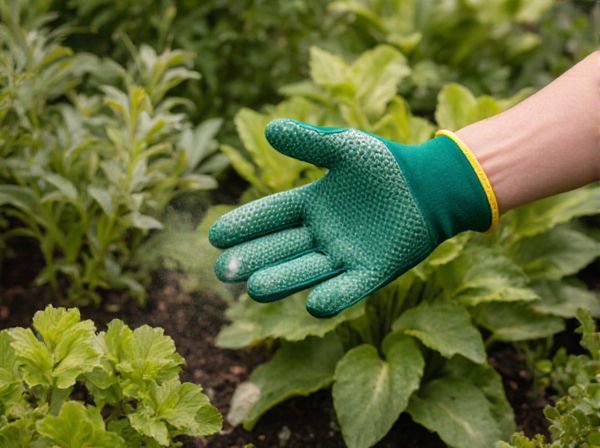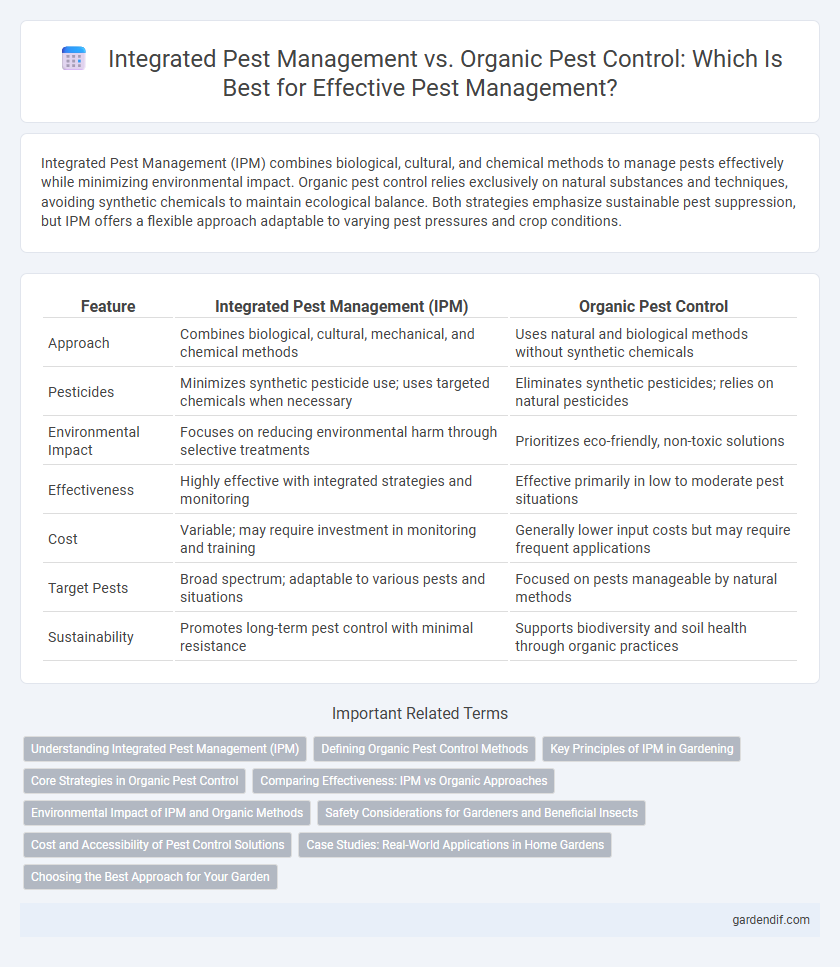
Integrated Pest Management vs organic pest control Illustration
Integrated Pest Management (IPM) combines biological, cultural, and chemical methods to manage pests effectively while minimizing environmental impact. Organic pest control relies exclusively on natural substances and techniques, avoiding synthetic chemicals to maintain ecological balance. Both strategies emphasize sustainable pest suppression, but IPM offers a flexible approach adaptable to varying pest pressures and crop conditions.
Table of Comparison
| Feature | Integrated Pest Management (IPM) | Organic Pest Control |
|---|---|---|
| Approach | Combines biological, cultural, mechanical, and chemical methods | Uses natural and biological methods without synthetic chemicals |
| Pesticides | Minimizes synthetic pesticide use; uses targeted chemicals when necessary | Eliminates synthetic pesticides; relies on natural pesticides |
| Environmental Impact | Focuses on reducing environmental harm through selective treatments | Prioritizes eco-friendly, non-toxic solutions |
| Effectiveness | Highly effective with integrated strategies and monitoring | Effective primarily in low to moderate pest situations |
| Cost | Variable; may require investment in monitoring and training | Generally lower input costs but may require frequent applications |
| Target Pests | Broad spectrum; adaptable to various pests and situations | Focused on pests manageable by natural methods |
| Sustainability | Promotes long-term pest control with minimal resistance | Supports biodiversity and soil health through organic practices |
Understanding Integrated Pest Management (IPM)
Integrated Pest Management (IPM) employs a strategic combination of biological, cultural, mechanical, and chemical methods to manage pest populations sustainably while minimizing environmental impact. IPM emphasizes monitoring pest levels and using targeted control techniques only when necessary, reducing reliance on harmful pesticides. This approach enhances long-term pest control effectiveness and promotes ecological balance compared to organic pest control methods that often rely solely on natural substances.
Defining Organic Pest Control Methods
Organic pest control methods rely on natural substances and biological processes to manage pest populations without synthetic chemicals, promoting environmental sustainability and biodiversity. Techniques include the use of beneficial insects like ladybugs and parasitic wasps, botanical insecticides such as neem oil, and cultural practices like crop rotation and habitat manipulation. These methods align with Integrated Pest Management (IPM) principles by emphasizing prevention, monitoring, and targeted interventions that minimize ecological disruption.
Key Principles of IPM in Gardening
Integrated Pest Management (IPM) in gardening emphasizes a strategic, science-based approach focusing on pest prevention, monitoring, and control using environmentally friendly methods. Key principles include pest identification, regular monitoring, setting action thresholds, and employing a combination of biological, cultural, mechanical, and chemical controls only when necessary. This method contrasts with organic pest control, which strictly limits interventions to natural and non-synthetic techniques without relying on chemical solutions.
Core Strategies in Organic Pest Control
Core strategies in organic pest control emphasize using natural predators, crop rotation, and organic-approved pesticides derived from botanical or mineral sources to minimize chemical impact on ecosystems. This approach prioritizes enhancing soil health, fostering biodiversity, and utilizing cultural practices like mulching and companion planting to disrupt pest life cycles. Integrated Pest Management incorporates these methods but also relies on monitoring and threshold-based interventions to optimize pest control efficacy while reducing environmental risks.
Comparing Effectiveness: IPM vs Organic Approaches
Integrated Pest Management (IPM) combines biological, cultural, physical, and chemical tools to achieve long-term pest control with minimal environmental impact, often resulting in higher effectiveness against diverse pest populations. Organic pest control emphasizes natural methods and excludes synthetic chemicals, which can limit its efficiency and speed but enhances safety and sustainability. Studies show IPM typically offers more consistent pest management outcomes, especially in large-scale agricultural settings, while organic approaches are more suited to eco-friendly practices and consumer preferences for chemical-free produce.
Environmental Impact of IPM and Organic Methods
Integrated Pest Management (IPM) minimizes environmental impact through targeted interventions that reduce pesticide use and preserve beneficial organisms, promoting ecosystem balance. Organic pest control relies on natural substances and biological methods, which are generally less toxic but may require more frequent applications, potentially affecting non-target species. Both approaches emphasize sustainability, but IPM's data-driven strategy often results in more precise, lower environmental impact compared to traditional organic practices.
Safety Considerations for Gardeners and Beneficial Insects
Integrated Pest Management (IPM) emphasizes targeted interventions that minimize chemical use, safeguarding both gardeners' health and beneficial insect populations like pollinators and predators. Organic pest control relies on natural substances and biological methods, reducing toxic exposure but may require careful selection to avoid harm to non-target beneficial species. Prioritizing safety involves monitoring pest thresholds, choosing selective treatments, and promoting habitat diversity to support resilient ecosystems and sustainable gardening practices.
Cost and Accessibility of Pest Control Solutions
Integrated Pest Management (IPM) offers cost-effective pest control by combining biological, cultural, and chemical methods tailored to specific infestations, often reducing long-term expenses compared to repeated organic treatments. Organic pest control tends to have higher upfront costs due to reliance on natural products like neem oil or diatomaceous earth, which may require frequent applications and specialized knowledge. IPM is more accessible for large-scale agricultural operations due to its flexible use of pesticides under regulation, while organic methods are favored in niche markets prioritizing sustainability despite limited availability and higher labor intensity.
Case Studies: Real-World Applications in Home Gardens
Case studies in home gardens demonstrate Integrated Pest Management (IPM) effectively combines biological controls, targeted pesticide use, and cultural practices to reduce pest populations while preserving beneficial insects. Organic pest control emphasizes natural remedies such as neem oil, insecticidal soaps, and companion planting, showing success in smaller-scale gardens with lower pest pressure. Research indicates IPM often delivers more sustainable long-term pest suppression by adapting strategies based on monitoring and pest thresholds.
Choosing the Best Approach for Your Garden
Integrated Pest Management (IPM) combines biological, cultural, and chemical methods to effectively control pests while minimizing environmental impact, making it a versatile choice for diverse garden conditions. Organic pest control relies on natural substances and ecological principles to maintain garden health but may require more frequent monitoring and intervention to achieve optimal results. Selecting the best approach depends on factors such as garden size, pest pressure, plant types, and personal preferences for sustainability and safety.
Integrated Pest Management vs organic pest control Infographic

 gardendif.com
gardendif.com